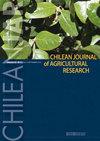我国日本雀麦(Bromus japonicus Houtt.)对氟卡松钠抗性的靶点基础
IF 1.7
4区 农林科学
Q2 Agricultural and Biological Sciences
引用次数: 1
摘要
日本雀麦(Bromusjaponicus Houtt.)是一种常见的一年生杂草,广泛分布于华北平原冬小麦(Triticum aestivum L.)地。在天津发现一个疑似对乙酰乳酸合成酶(ALS)抑制剂具有耐药性的日本血吸虫种群(TJ06)。在本研究中,鉴定了ALS基因中存在Asp-376-Glu突变的TJ06群体。TJ06群体对氟卡松钠产生了66.7倍的抗性,对其他两种抑制ALS的除草剂表现出明显的交叉抗性。吡嘧磺隆和甲基中磺隆除草剂的50%植物生长抑制率分别为28.72和39.44 g ai ha-1。在体外ALS活性测定中,TJ06抑制50%ALS活性所需的氟卡唑酮钠浓度(I50)是易感群体(TJ01)的11.3倍,这与全植物反应实验的浓度高度相关,表明导致抗性的Asp-376-Glu突变降低了ALS酶对氟卡唑钠的敏感性。此外,设计了一个衍生的裂解扩增多态性序列(dCAPS)标记,用于快速检测日本血吸虫ALS基因的Asp376突变。日本Bromus japonicus已经进化出对氟卡唑酮的高水平抗性,并通过ALS基因中的Asp-376-Glu突变证明了这种抗性的分子机制。这些结果表明,在中国,持续和密集施用氟卡松钠已导致日本血吸虫病的抗性,因此,在麦田中建立一个综合杂草管理系统是非常必要的。本文章由计算机程序翻译,如有差异,请以英文原文为准。
Target-site basis for resistance to flucarbazone- sodium in Japanese brome (Bromus japonicus Houtt.) in China
Japanese brome ( Bromus japonicus Houtt.) is a troublesome annual weed and widely distributed in winter wheat ( Triticum aestivum L.) fields in the North China Plain. A B. japonicus population (TJ06) suspected of resistance to acetolactate synthase (ALS) inhibitors was found in Tianjin, China. In this study, the TJ06 population with an Asp-376-Glu mutation in ALS gene was identified. TJ06 population developed 66.7-fold resistance to flucarbazone-sodium and exhibited obvious cross-resistance to other two ALS-inhibiting herbicides. The 50% plant growth reduction (GR 50 ) to herbicides of pyroxsulam and mesosulfuron-methyl were 28.72 and 39.44 g ai ha -1 , respectively. In in vitro ALS activity assays, the concentration of flucarbazone-sodium required to inhibit 50% ALS activity (I 50 ) for TJ06 was 11.3-fold greater than that for a susceptible population (TJ01), which was highly correlated with that of whole-plant response experiments and indicated that the Asp-376-Glu mutation leading to resistance reduced sensitivity of the ALS enzyme to flucarbazone-sodium. Besides, one derived cleaved amplified polymorphic sequence (dCAPS) marker was designed to quickly detect Asp376 mutation in ALS gene of B. japonicus . of Bromus japonicus has evolved high-level resistance to flucarbazone, and demonstrates the molecular mechanism underlying this resistance by an Asp-376-Glu mutation in the ALS gene. These results demonstrate that persistent and intensive application of flucarbazone-sodium has resulted in resistance in B. japonicus in China, and an integrated weed management system is highly necessary for B. japonicus control in wheat fields.
求助全文
通过发布文献求助,成功后即可免费获取论文全文。
去求助
来源期刊
CiteScore
3.00
自引率
11.80%
发文量
60
审稿时长
6 months
期刊介绍:
ChileanJAR publishes original Research Articles, Scientific Notes and Reviews of agriculture, multidisciplinary and agronomy: plant production, plant protection, genetic resources and biotechnology, water management, soil sciences, environment, agricultural economics, and animal production (focused in ruminant feeding). The editorial process is a double-blind peer reviewing, Editorial Office checks format, composition, and completeness, which is a requirement to continue the editorial process. Editorial Committee and Reviewers evaluate relevance and scientific merit of manuscript.

 求助内容:
求助内容: 应助结果提醒方式:
应助结果提醒方式:


